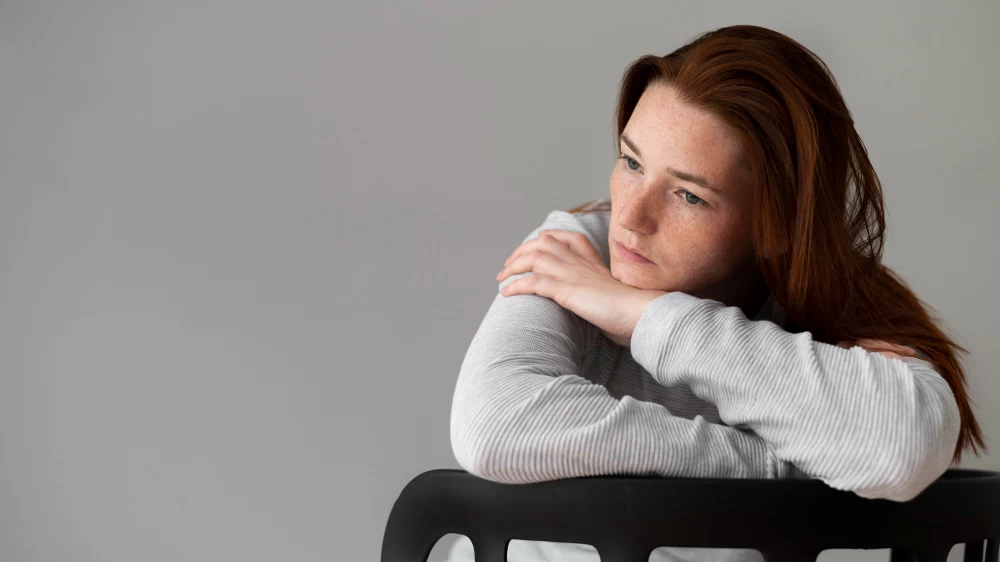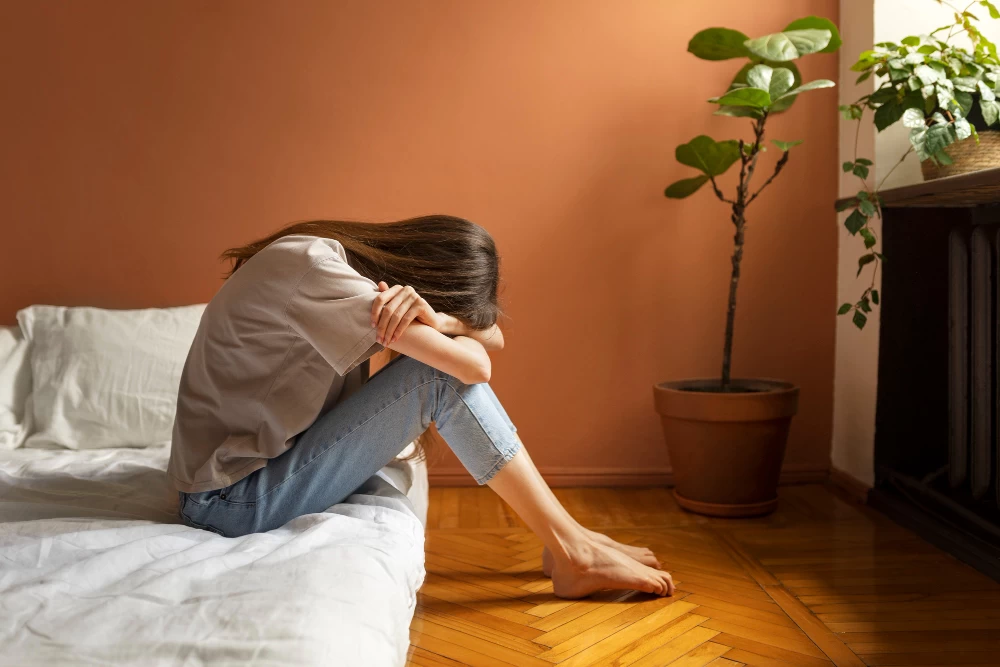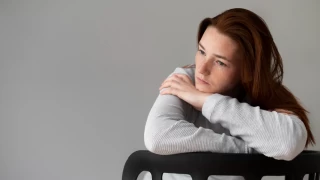
What is Anxiety?
- What is Anxiety?
- What Are the Symptoms of Anxiety?
- Who Gets Anxiety?
- How to Calm Anxiety
- What Are the Good Things for Anxiety?
- How Is Anxiety Treated?
Anxiety is a common and natural human response to stress or danger. Anxiety is an emotional and physical condition characterized by feelings of fear and restlessness. While some anxiety is normal and even beneficial in certain situations, such as motivating someone to prepare for a test or perform well in a job interview, excessive or persistent anxiety can become problematic and interfere with daily life.
Anxiety disorders are a group of mental health conditions in which anxiety becomes chronic, severe, and impairs a person's ability to function normally. Some common anxiety disorders include Generalized Anxiety Disorder (GAD), Panic Disorder, Social Anxiety Disorder (Social Phobia), and Specific Phobias. These disorders are often associated with symptoms such as extreme anxiety, restlessness, irritability, difficulty concentrating, trouble sleeping, and physical symptoms such as rapid heartbeat, sweating, tremors, and shortness of breath.
Anxiety can have a variety of causes, including genetic factors, brain chemistry imbalances, environmental stressors, traumatic experiences, and certain medical conditions. It's important to remember that anxiety disorders are treatable, and a combination of treatments such as cognitive-behavioral therapy (CBT), medications, and lifestyle changes can help manage and alleviate anxiety symptoms. If you or someone you know is experiencing severe anxiety, it is recommended that you seek professional help from a mental health professional.
What Are the Symptoms of Anxiety?
Anxiety is a common mental health condition that can cause a variety of symptoms.
The specific symptoms and their severity can vary from person to person, but here are some common signs and symptoms of anxiety:
- Extreme anxiety: Feeling restless or having a constant feeling of anxiety or restlessness.
- Feeling uneasy: Having a constant feeling of restlessness or being nervous.
- Difficulty concentrating: Difficulty concentrating or having a clear mind.
- Irritability: Getting angry or feeling irritable easily.
- Sleep disorders: Difficulty falling asleep, staying asleep, or having restless, unsatisfying sleep.
- Fatigue: Feeling tired, lacking energy, or having a general feeling of tiredness.
- Muscle tension: Experiencing muscle aches or tension.
- Physical discomfort: Symptoms such as headache, stomachache, or other physical ailment without an obvious medical cause.
- Racing thoughts: Having a fast stream of thoughts or experiencing racing thoughts.
- Panic attacks: Sudden and intense attacks of fear or discomfort, usually accompanied by physical symptoms such as rapid heartbeat, sweating, tremors, shortness of breath, chest pain or a sense of impending doom.
- Avoidance behavior: Avoiding situations or places that trigger anxiety or panic.
- Social withdrawal: Withdrawal from social interactions or avoiding social situations due to anxiety.
- Overthinking and catastrophizing: Getting into repetitive and negative thinking patterns, imagining worst-case scenarios and waiting for the worst outcome.
- Physical symptoms: Experiencing physical sensations such as dizziness, nausea, hot flashes, sweating, tremors, or rapid heartbeat.
It is important to note that symptoms of anxiety can overlap with symptoms of other medical or psychiatric conditions. If you or someone you know is experiencing these symptoms and is interfering with daily life, it is recommended that you seek professional help from a specialist for correct diagnosis and appropriate treatment.
Who Gets Anxiety?
Anxiety is a common mental health condition that can affect anyone, regardless of age, gender, or background. It is estimated that about 1 in 5 adults in the United States will experience an anxiety disorder at some point in their lives. While anxiety can occur in people of all ages, it usually appears during childhood, adolescence or early adulthood.
Anxiety disorders encompass a range of conditions, including Generalized Anxiety Disorder (GAD), Panic Disorder, Social Anxiety Disorder, Specific Phobias, and others. These disorders involve such extreme anxiety and fear that they can interfere with daily functioning and well-being.
It is important to note that it is normal and part of human experience to experience occasional anxiety or to feel anxious in certain situations. However, when anxiety becomes chronic, intensifies, and disrupts daily life, it may be diagnosed as an anxiety disorder.
Several factors can contribute to the development of anxiety disorders, including genetics, brain chemistry, personality traits, traumatic life events, and ongoing stress. It is a complex interaction of biological, psychological and environmental factors.
It is very important to seek professional help if you or someone you know is experiencing persistent anxiety symptoms. Mental health professionals such as psychologists and psychiatrists can make an appropriate diagnosis and develop an appropriate treatment plan, which may include therapy, medication, or a combination of both.

How to Calm Anxiety
Anxiety can be difficult to deal with, but there are a few techniques you can try to help calm your anxiety.
Here are some strategies that can help you:
- Deep breathing: Do deep breathing exercises such as diaphragmatic breathing or box breathing. These techniques can help activate your body's relaxation response and reduce anxiety.
- Progressive muscle relaxation: Start by stretching and relaxing different muscle groups in your body. This technique can help relieve tension and promote general relaxation.
- Mindfulness meditation: Engage in mindfulness practices to bring your attention to the present. Focus on your breathing or observe your thoughts and feelings without judgment. Regular meditation can help reduce anxiety over time.
- Physical exercise: Engage in regular physical activity such as walking, running or yoga. Exercise releases endorphins, which can improve your mood and reduce anxiety.
- Limit caffeine and alcohol: Stimulants such as caffeine and alcohol can exacerbate anxiety symptoms. Limit your intake or avoid them altogether, especially if you are prone to anxiety.
- Get enough sleep: Prioritize good sleep hygiene and make sure you get enough rest. Lack of sleep can make anxiety worse, so establish a regular sleep schedule and a relaxing bedtime routine.
- Challenge negative thoughts: When anxious thoughts arise, challenge their accuracy and replace them with more realistic and positive thoughts. Cognitive-Behavioral Therapy (CBT) techniques can be helpful in addressing negative thinking patterns.
- Social support: Reach out to friends, family or support groups to share your feelings and concerns. It can be comforting to talk to others who understand and can provide reassurance.
- Relaxation techniques: Explore different relaxation techniques, such as listening to soothing music, applying aromatherapy, taking a warm bath or participating in a hobby you enjoy. Find activities that help you relax and make time for them regularly.
- Seek professional help: If anxiety becomes overwhelming and significantly interferes with your daily life, consider seeking support from a mental health professional. They can provide guidance, therapy, or medication if needed.
Remember that everyone's experience with anxiety is different, so it may take some time to find the strategies that work best for you. Be patient with yourself and practice self-care regularly.
What Are the Good Things for Anxiety?
There are several strategies and practices that can help alleviate anxiety.
Here are some good things you can try:
- Relaxation techniques: Engage in activities that promote relaxation, such as deep breathing exercises, progressive muscle relaxation, meditation or yoga. These techniques can help calm your mind and reduce anxiety symptoms.
- Regular exercise: It is known that physical activity has a positive effect on mental health. Exercising regularly can help reduce anxiety and improve your overall well-being. Aim for at least 30 minutes of moderate-intensity exercise most days of the week.
- Healthy lifestyle habits: Eat a balanced diet, get enough sleep and avoid excessive caffeine and alcohol intake. These lifestyle factors can contribute to your overall mental well-being and help you manage anxiety.
- Cognitive-behavioral therapy (CBT): Consider seeking therapy from a qualified mental health professional who specializes in CBT. CBT helps identify and change negative thought patterns and behaviors associated with anxiety. It can provide you with effective coping mechanisms and strategies to manage anxious thoughts and feelings.
- Social support: Reach out to your friends, family or support groups. Talking about your feelings with trusted individuals can provide comfort and perspective. Social support can be invaluable in managing anxiety.
- Mindfulness and meditation: Practice mindfulness techniques to be present and reduce anxiety. Meditation can help you train your mind to focus and let go of worries and intrusive thoughts.
- Relaxing activities: Engage in activities that bring you joy and relaxation. This may include hobbies such as reading, listening to music, bathing, spending time in nature or pursuing creative outlets.
- Time management: Organize and prioritize your daily tasks. Breaking down overwhelming tasks into smaller, manageable steps can help reduce anxiety. Effective time management can also reduce stress and provide a sense of control over your life.
- Limit exposure to triggers: Identify situations or environments that tend to trigger your anxiety and try to minimize your exposure to them. This may include setting boundaries, avoiding certain triggers, or developing coping strategies to navigate these situations more effectively.
- Professional help: If your anxiety persists and interferes significantly with your daily life, it is important to seek professional help. A mental health professional can make a diagnosis, offer appropriate treatment options, and guide you through the process of managing anxiety.
Remember, everyone's anxiety experience is unique, so it's very important to find what works best for you. Applying these strategies consistently, seeking professional help when needed, and maintaining a holistic approach to your well-being can all contribute to managing anxiety effectively.
How Is Anxiety Treated?
Anxiety can be treated with a variety of approaches, and the most effective treatment options depend on the severity of the anxiety, individual preferences, and a healthcare professional's recommendations.
Some common approaches to treating anxiety include:
- Therapy: Psychotherapy or talk therapy is a commonly used treatment for anxiety. Cognitive-Behavioral Therapy (CBT) is particularly effective for anxiety disorders. CBT helps identify and change negative thought patterns and behaviors that contribute to anxiety. Other forms of therapy may also be recommended, such as exposure therapy or mindfulness-based therapies.
- Medications: Some medications may be prescribed to help manage anxiety symptoms. These may include selective serotonin reuptake inhibitors (SSRIs), serotonin-norepinephrine reuptake inhibitors (SNRIs), benzodiazepines, or other anti-anxiety medications. Medications should be prescribed and monitored by a qualified healthcare professional.
- Lifestyle changes: Incorporating healthy habits into daily life can have a positive effect on anxiety. Regular exercise, adequate sleep, a balanced diet, and stress reduction techniques such as deep breathing, meditation or yoga can all help manage anxiety symptoms.
- Stress management techniques: Learning effective stress management techniques can help reduce anxiety levels. This may include managing time, setting realistic goals, prioritizing tasks, and practicing relaxation techniques such as deep breathing, progressive muscle relaxation, or guided imagery.
- Support networks: Building a strong support network of friends, family or support groups can provide emotional support and understanding. Sharing experiences with others with similar struggles can help relieve symptoms of anxiety.
- Avoiding triggers: It is important to identify and avoid triggers that worsen anxiety. This may include minimizing exposure to certain situations, substances, or activities that trigger anxiety symptoms.
- Complementary and alternative therapies: Some people find relief from anxiety symptoms with complementary and alternative treatments such as acupuncture, massage, herbal supplements or aromatherapy. These should be used with caution and discussed with a healthcare professional.
It is very important to consult a qualified healthcare professional such as a psychologist, psychiatrist or therapist to discuss the best treatment options for your particular situation. They can provide a comprehensive assessment and implement a treatment plan that will effectively meet your needs.


